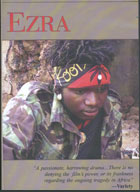
Ezra 2007
Distributed by California Newsreel, Order Dept., PO Box 2284, South Burlington, VT 05407; 877-811-7495 (toll free)
Producer n/a
Directed by Newton I. Aduaka
DVD, color, 110 min.
Adult
Child Development, Rehabilitation, African Studies
Date Entered: 07/31/2008
Reviewed by Miriam Conteh-Morgan, The Ohio State University Libraries, Columbus, OHThe conversation about child soldiers in Sierra Leone has moved beyond the halls of international conferences on peace and rehabilitation to become part of the general public discourse, due largely to Ishmael Beah’s book A Long Way Gone: Memoirs of a Boy Soldier (Farrar, Straus and Giroux, 2007). Ezra brings the topic to the screen, the first by an African filmmaker.
The story of how young boys and girls were abused in conflict situations and denied their childhood is sympathetically portrayed through the eponymous character in the film Ezra. Structured through a series of flashbacks, his trajectory unfolds, in a jagged line that is sometimes confusing, from his abduction as a six year-old from the sleepy schoolyard, to his military training and war exploits, and the testimonies at the Truth and Reconciliation Hearings.
Initially used as porters, the kids bear much more than physical burdens later on. They are trained to repudiate family and social networks, and are indoctrinated to give loyalty to the cause of the Brotherhood headed by the rebel leader Rufus. The teenaged Ezra becomes a squad leader, but he is variously depicted as shy, aloof and playful, a characteristic typically exhibited by a normal adolescent, not a committed fighter. Under the influence of drugs, he leads the attack on his village on January 6, 1999 and blows up his own home with his parents still inside. His older sister watches the atrocities from her hiding place, but she is herself brutally attacked and has her tongue cut out. That date remains a painful, unforgotten one in Sierra Leone’s history.
When Ezra later learns about the massacre, he blames another rival group and asks permission from Rufus to avenge their deaths. Ironically, it is during this failed mission, when his dreamy-eyed, militant, girlfriend, Mariam, aka Black Diamond, is kidnapped that the scales fall off and Ezra loses faith in the Brotherhood. He deserts and makes his way to the rival rebel camp to find her; he is held prisoner there, tortured, and made to provide valuable information about the location of Rufus’ camp. By this time, he has come to the conclusion that what the fighting factions are really concerned about is access to the diamond mines, not the patriotism they use to justify their cause.
The disillusioned Ezra fears for his safety and decides to leave the country with Mariam and their unborn child, but first returns to his village to meet his sister. Together, they leave, hoping to find refuge in neighboring Guinea. However, their bus is ambushed en route, Mariam gets killed in the crossfire, and Ezra is brought to the government-run rehabilitation centre. The angry young man he has become struggles with the demons of nightmares, drug withdrawal and mood swings. At the Truth and Reconciliation Hearings, he angrily justifies his role in the war by spouting rebel propaganda, and refuses to accept that he committed crimes. By the end of the film, however, he finally admits to them and immediately passes out. The weight has fallen off him and this clears the way for his redemption and reintegration into society.
More than just a story of war and child soldiers, Ezra is also a story of friendship and loyalty. Like the children they really are, the film shows normal scenes of them teasing and ribbing each other. In addition to finding love, Ezra also forges friendships with other boys in the Brotherhood. In a touching scene, one of them, Moses, offers a rough diamond to Mariam once he learns that she is expecting a baby, who she promises to name after him. In a show of loyalty and understanding, a fellow child abductee and nun refuses to condemn Ezra for attacking his village. Also, Ezra’s sister remains fiercely loyal to him, even though she witnessed his acts of violence, and even when he rejects her. Her testimony at the hearings forces him to confess to the crime, thereby saving himself from himself. As Mariam wisely points out when she first meets Ezra, “We are all Ikemefuna,” a reference to the young man who was sacrificed for the good of the community in Chinua Achebe’s classic novel, Things Fall Apart. Ezra is a complex and compelling story, cleverly pieced together.